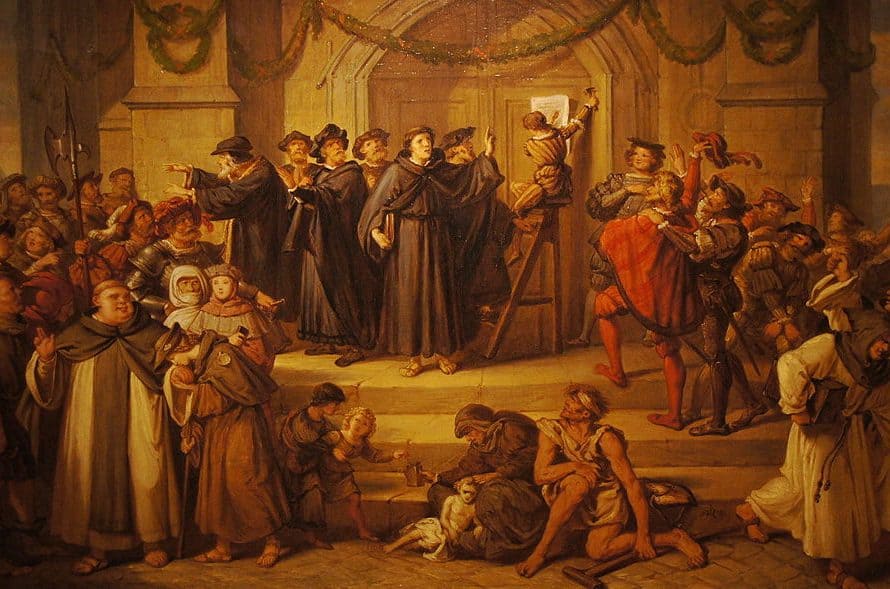EDITOR’S NOTE: This is the sixth column in a year-long series leading up to the 500th anniversary of the 16th-century Reformation on Oct. 31, 2017.
When Martin Luther proclaimed the truth that God justifies sinners by faith alone, he declared also that Christians must follow Jesus amid the joys and storms of day-to-day life in the world. There was no place, any longer, for secluding oneself to seek a holy life in a cloister. Whereas medieval religion placed monastic solitude and celibacy on a spiritual pedestal, Luther instead affirmed that God had ordained marriage, family and one’s daily work as the altar where each Christian dies to himself, and as the classroom where he learns truly how to love God and one’s neighbor. Whether ruling an empire, plowing fields or rearing children, each Christian’s daily labor is an opportunity to trust God and imitate Christ’s love by serving others.
In short, Luther’s Reformation had an impact not only on religion, but also on work.
“I advise no one to enter any religious order or the priesthood,” Luther wrote in 1520, in a brief tract called The Babylonian Captivity of the Church. “Indeed, I advise everyone against it—unless he is forearmed with this knowledge and understands that the works of monks and priests, however holy and arduous they may be, do not differ one whit in the sight of God from the works of the rustic laborer in the field or the woman going about her household tasks, but that all works are measured before God by faith alone.”
Indeed, according to Luther, all works are measured by God—and, in themselves, they are found wanting. As the Prophet declared in Isaiah 64:6, “all our righteous deeds are like a filthy garment,” and as the Teacher says in Ecclesiastes 2:26 our labor and toil “under the sun” are all in vain, merely “a striving after the wind.” Through the fall of the first man, Adam, all of us have died in sin and are unable to please God. Likewise, as God told Adam in Genesis 3:17, “Cursed is the ground because of you; in pain you shall eat of it all the days of your life; thorns and thistles it shall bring forth for you.” As a result of the fall, our daily labor in this world became toilsome and often futile.
In short, sin tarnishes and enslaves our hearts and minds, and it brings the works of our hands to nothing.
And this is why Luther’s message is such an encouragement: He declared that the sacrifice of Jesus Christ on the cross delivers sinful humanity from every effect of the fall. And to gain Christ, with all his benefits, we need only trust Him.
Only Jesus can cleanse our hearts and free us from sinful thoughts. So we must come to Him in faith. By faith alone, we are justified and made righteous in God’s sight.
Likewise, only Christ’s blessing can fill our daily work with true meaning and purpose. “Unless the Lord builds the house,” the Psalmist says, “they labor in vain that build it. Unless the Lord guards the city, the watchman stays awake in vain” (Psalm 127:1). In other words, we may plant a seed and water it, but only God can make it grow. We must, therefore, trust Him to do so in His time and in His way. We must trust Him to bring meaningful, eternal fruit from our daily labor. By faith in Christ Jesus, God is our Father. We are His children, and it is His “good pleasure” not only to care for our daily needs, but also to grant us a heavenly kingdom. As such, we should fear neither famine nor futility (Luke 12:32).
In this faith, we can find true security, peace and rest—knowing that our gracious Father can make our vocations, our relationships and our lives fruitful for His kingdom by faith in Christ. For this reason, Luther once commented to a close friend, “We worship God also when we rest; indeed, there is no greater worship of God than this.”
Explaining this comment in his book, The Ethics of Martin Luther, historian Paul Althaus once wrote, “How is it possible for us to worship God more when we rest than when we work? At this point we once again stand at the center of Luther’s theology: God is God and he alone is creator. We can worship God by resting; indeed, in resting we can worship Him better than in any other way because it is when we really relax our body and soul that we cast our care on God. We thus honor God as the one whose blessing rests upon and surrounds all our work, and who keeps on working for us even when we rest and sleep. The capacity truly to rest from our cares with our body and soul is a special confirmation of our faith and is related to justifying faith.”
Or, as the Psalmist also says, “It is vain for you to rise up early, to sit up late, to eat the bread of sorrows; for He gives His beloved sleep” (Psalm 127:2).

